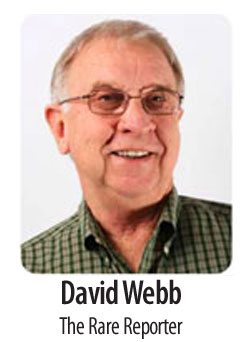Report projecting gay community’s buying capacity at $790 billion in 2012 again confirms what I first discovered at 14 in Wichita Falls
 If I had to choose one little phrase that best defines the remarkable advancement of LGBT people in modern society over the past 50 years, it would have to be, “Money talks.”
If I had to choose one little phrase that best defines the remarkable advancement of LGBT people in modern society over the past 50 years, it would have to be, “Money talks.”
I base that partially on the recent report projecting America’s LGBT buying power for 2012 at a whopping $790 billion, an analysis that is released annually by Bob Witeck, a marketing expert who heads Witeck Communications and has provided the financial information for two decades. He noted this year that about 6.7 percent of the adult U.S. population, an estimated 16 million people 18 and older, self-identify as LGBT.
But I also base it on my personal experience.
I first realized this phenomenon when I was about 14 and was still wavering between whether I was or wasn’t a homosexual, a word I first spied in an Ann Landers advice column in 1963.
After consulting the giant dictionary at the public library, I realized such people truly did exist in society, and that when people used the word “queer” or “fag,” it wasn’t just a joke or an insult. It was for real.
Today, it’s hard to imagine a time when LGBT people weren’t openly discussed in the newspaper, on television or in group conversations, but that’s the way it was a half-century ago.
My discovery put me on alert for any mention of real people in connection with the use of the slurs, and it wasn’t long before I hit pay dirt.
At the time my family owned a successful used car lot and salvage auto parts store near Sheppard Air Force Base in Texas. I used to hang around there a lot after school and on Saturdays, partly out of boredom and partly because a fascinating array of people visited the store.
One of the best customers was a well-dressed man in his 40s who wore a black toupee and was forever losing the hubcaps on his car. He apparently drank a lot and spent much of his time during the evenings visiting nightclubs where his hubcaps would get stolen. Either that or he lost them by running into curbs as he drove home drunk at night. There was a lot of speculation about that.
After the man, who was a local divorced businessman, left one day, I overheard another customer tell my older brother that he couldn’t believe my family would do business with that “queer.”
My brother, who was about 30 and married, replied, “Listen, that man is a good customer. He pays cash. That’s all I need to know about him.” End of conversation.
Now that intrigued me, and it wasn’t long before I was ferreting out more information. As it happened, I also used to hang out at another business down the road that was owned by the parents of a couple of my friends. It was a restaurant, and I knew the mysterious man was a customer there, too.
One evening I was talking to the wife of the prosperous restaurant owner who also liked to hang around supervising the cooks and waitresses, mostly because she tended to tip the bottle herself and it was a convenient setting. After a couple of hours of supervising, I knew she tended to get talkative, relaxed and it was possible to approach subjects she otherwise might prefer to avoid.
So I asked her about the mysterious man, whom she acknowledged having known for years. From that point, all I really had to do was sit back and listen because the story tumbled out. I learned the man’s wife had discovered his proclivity for other men and divorced him even though they had a daughter.
After the divorce and the resulting scandal, the man had decided to hell with it and began to pursue his interest in men with relish. It turned out he was one of many such men living in Wichita Falls, and he was quite popular in the mini-society. The entire group of men frequented the restaurant, and they often entertained airmen from the Air Force base there, she said.
Again, I got the same message from the restaurant owner’s wife. “They drink, they spend lots of money, they tip the waitresses well, and they’re always nice to everybody,” she said. “Their money is as good as everybody else’s.”
The restaurant owner’s wife, whom I always viewed as something of an intellectual who might have been capable of achievements in her own right, went on to tell me that one of society’s dirty little secrets was that everybody knew that there always had been and always would be a certain percentage of both men and women who preferred the company of their own sex to the opposite one. She noted her husband shared her views in all respects.
In the space of about an hour’s conversation my view of the world had suddenly become more practical and more sophisticated at the same time. And the steady growth of the LGBT community’s size and buying power over the years has proved to me that the slightly tipsy restaurant owner’s wife knew what she was talking about.
David Webb is a veteran journalist who has covered LGBT issues for the mainstream and alternative media for three decades. Contact him at
davidwaynewebb@yahoo.com.
This article appeared in the Dallas Voice print edition April 6, 2012.
